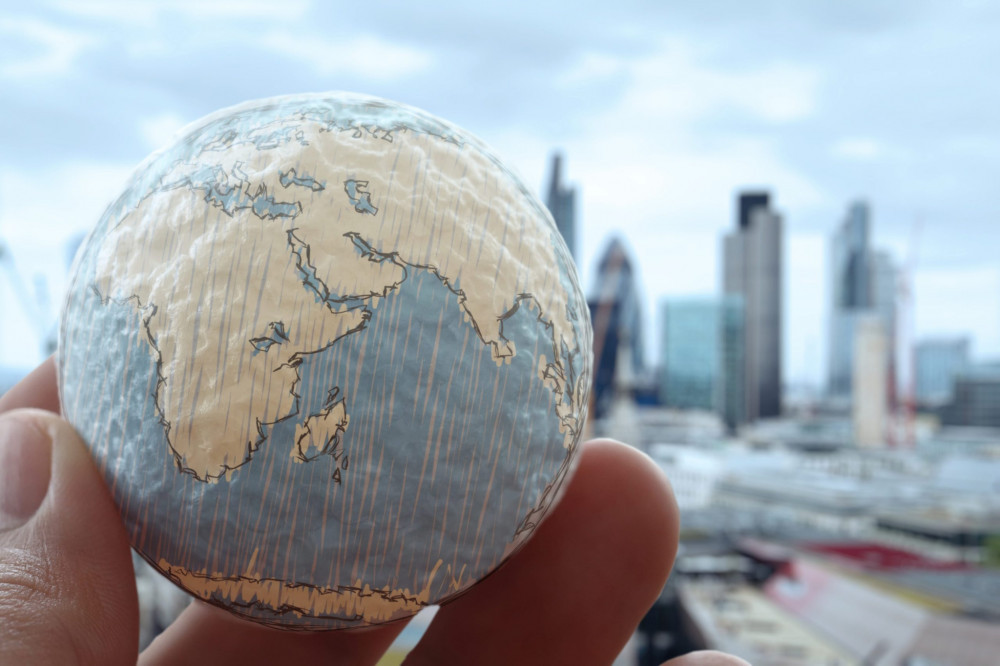Everything About Globalization
Everything About Globalization
The word “globalization” refers to how commerce and technology have made the globe a more interconnected and interdependent place. Globalization also encompasses the economic and societal developments that have resulted as a consequence of it.
It may be compared to the strands of a massive spider web that have grown over millennia, with the quantity and reach of these threads growing with time. People, money, material products, ideas, and even sickness and disaster have all crossed these silken links in larger numbers and at a faster rate than at any other time in human history.
Want to Start Making Money Online?
Try My #1 Recommendation Program!
When did globalization start and when did it end? Many experts believe it began in 1492 with Columbus' trip to the New World. People went to local and distant locations even before Columbus' journey, sharing ideas, goods, and traditions along the route.
Perhaps the most well-known early example is the Silk Road, a historic network of trade routes that spanned across China, Central Asia, and the Mediterranean between 50 B.C.E. and 250 C.E. The Silk Road commerce, like subsequent globalization booms, relied heavily on new technology.
Advances in metallurgy led to the manufacture of coinage; advancements in transportation led to the construction of highways linking the main empires of the time, and greater agricultural productivity allowed for more food to be transported between locations.
Along with Chinese silk, Roman glass, and Arabian spices, things like Buddhist beliefs and paper-making secrets circulated via these trade tendrils.
These kinds of transactions were undeniably enhanced during the Age of Exploration when European sailors looking for new sea routes to Asia's spices and silks instead came upon the Americas. Maritime trade routes expanded between ancient and newly found continents, and technology played an essential role once again.
The success of the explorers was largely due to new ship designs and the invention of the magnetic compass. Ships transporting plants, animals, and Spanish silver between the Old and New Worlds also transported Christian missionaries, extending trade and idea exchange to a hitherto disconnected area of the globe.
Through the Age of Revolution, when ideals like liberty, equality, and fraternity spread like wildfire from America to France to Latin America and beyond, the network of globalization continued to stretch out.
Powered by the creation of factories, railroads, steamboats, automobiles, and aircraft, it rode the waves of industrialization, colonization, and war through the eighteenth, nineteenth, and twentieth centuries.
Globalization accelerated during the Information Age. Computer and communications advances ushered in a new global age, redefining what it meant to be “connected.” For the first time, the 1964 Summer Olympics in Tokyo could be seen in the United States thanks to modern communications satellites.
Someone in Germany may read about a breaking news story in Bolivia in real-time thanks to the World Wide Web and the Internet. A person could travel from Boston, Massachusetts, to London, England, in hours rather than the week or more it would have taken a century before.
This digital revolution has a significant influence on economies all around the globe, making them more information-based and interconnected. Economic success or failure at one central location of the global network may be felt in every major international economy in the contemporary period.
The virtues and downsides of globalization are still being debated. Globalization's drawbacks may be observed in the increased likelihood of illnesses like ebola or severe acute respiratory syndrome (SARS) spreading, or in the kind of environmental damage that scientist Paul R. Furumo has investigated in microcosm in tropical palm oil fields.
Want to Find Out How To Start Your Home-Based Business?
Try My #1 Recommendation Platform!
Globalization has, of course, resulted in a lot of good. Richer countries may now—and do—come to the help of poorer countries in distress. Many nations' growing diversity has resulted in greater opportunities to learn about and enjoy various cultures. There is a growing feeling of a global community, a worldwide “us.”
Globalization refers to the acceleration of global movements and exchanges (of people, products, services, money, technology, and cultural practices). Globalization has the effect of promoting and increasing relationships between various locations and communities across the world.
Globalization, according to the World Health Organization, is “the greater interconnection and interdependence of peoples and nations.” It is often believed to involve two interrelated elements: the opening of international boundaries to more rapid movements of products, services, money, people, and ideas, as well as changes in national and international institutions and policies that support or encourage such flows.”
What Exactly Is Economic Globalization?
Globalization can be defined as “(…) the increasing interdependence of world economies as a result of the growing scale of cross-border trade of commodities and services, the flow of international capital, and the wide and rapid spread of technologies,” according to the Committee for Development Policy (a UN subsidiary body).
It shows the continued growth and mutual integration of market boundaries (…) as well as the rapidly expanding importance of information in all forms of productive activity. Marketization and economic globalization are the two fundamental driving factors.”
In Geography, What Is Globalization?
Globalization is described as a series of forces (economic, social, cultural, technical, and institutional) that contribute to the link between societies and persons all over the globe in geography. It is a gradual increase in the number of interactions and flows between various regions of the globe.
What Is The G20 And What Does It Have To Do With Globalization?
The G20 is a worldwide group made up of 19 nations' governments and central bank governors, as well as the European Union (EU). The G20, which was founded in 1999, brings together the world's most powerful industrialized and developing nations to debate global economic and financial stability.
The G20 countries together account for around 80% of worldwide economic production, almost 75% of global commerce, and roughly two-thirds of the world's population.
An annual summit of G20 leaders is held to address and coordinate critical global problems of mutual concern. Though economics and trade are normally at the top of the agenda at each summit, concerns such as climate change, migration policy, terrorism, the future of employment, and global wealth are also often discussed.
Because the G20 leaders are the “political backbone of the global financial architecture,” ensuring open markets, orderly capital flows, and a safety net for countries in trouble, major international agreements and globalization progress are frequently achieved through bilateral meetings during summits.
Because of the reduction of trade barriers and the execution of massive financial reforms, the G20 leaders' united effort was certainly beneficial in saving the global financial system during the 2008/2009 crisis.
Nonetheless, the G20 has struggled to coordinate monetary and fiscal policies and has been unable to combat tax evasion and corruption, among other globalization drawbacks.
As a consequence of these and other G20 failures to coordinate globalization, populist-nationalist movements throughout the globe have argued that nations should follow their own interests or build productive alliances.
What Can We Do To Make Globalization More Fair?
Countries' capacity to rise beyond narrow self-interest has resulted in unparalleled economic affluence and a plethora of useful scientific advances.
However, not everyone has benefited equally from globalization and technological advancement for several reasons: income is unequally distributed, and economic expansion has come at a high environmental cost.
How can nations put their national interests aside and work together to create a fairer society and a healthier planet? What can we do to make globalization more equitable?
“Debates about trade and access to foreign goods are as old as society itself,” according to Christine Lagarde, former President of the International Monetary Fund, and history shows that closing borders or implementing protectionism policies is not the way to go, as many countries that have tried have failed.
We should promote globalization policies that prolong the advantages of openness and integration while minimizing their negative consequences, according to Lagarde. The subject of how to make globalization more equitable is a difficult one that requires rethinking economic structures. But how do you do it? That is the query.
Globalization is intimately linked to economic systems and markets, which, in turn, are influenced by social difficulties, difficult-to-overcome cultural variables, geographical specificities, action timings, and collaborative networks. Apart from a solid definition of the term “just,” all of this requires global agreement and collaboration on the one hand and country-specific solutions on the other.
Are You Tired Of Scams?
Try The Most-Trusted Training Platform To Make Money Online!
When Did Globalization Start And When Did It End? Globalization: A Brief History
For some, this worldwide phenomenon is inextricably linked to human nature. As a result, some argue that globalization began about 60,000 years ago, at the dawn of human history. The exchange of goods and services between human communities has grown throughout time.
Different civilizations have created economic trade routes and enjoyed cultural interactions from ancient times. In addition, the migratory phenomenon has had a role in these demographic shifts. Particularly now that travel has become faster, more pleasant, and more economical.
Throughout history, this pattern has persisted, most notably via military victories and exploratory voyages. Globalization accelerated only after technical advancements in transportation and communication. World trade increased to such a magnitude and pace after the second half of the twentieth century that the word “globalization” began to be widely used.
Globalization Case Studies (Concept Map)
We frequently conceive of globalization as an economic and financial phenomenon because of trade developments and financial exchanges. Nonetheless, it encompasses a considerably broader range of activities than merely the movement of products, services, or cash. Some instances of globalization, often known as the globalization idea map:
- Economic globalization refers to the growth of trade systems among transnational players such as companies and non-governmental organizations (NGOs).
- Financial globalization: is associated with the emergence of a global financial system that includes international financial and monetary transactions. Stock markets, for example, are a fantastic illustration of the financially interconnected global globe since a collapse in one market has a negative impact on other markets and the economy as a whole.
- Cultural globalization: refers to the interpenetration of cultures, as a result of which nations adopt the values, beliefs, and costumes of other countries, abandoning their own culture in favour of a multinational supra-culture.
- Political globalization: the rise in power and influence of international organizations such as the United Nations and the World Health Organization (WHO) implies that government action now takes place on a worldwide scale. Other international organizations, such as Doctors Without Borders and Oxfam, operate on a worldwide scale.
- Sociological globalization: information, as well as the connectivity and interdependence of events and their repercussions, travels nearly in real-time. People also migrate around a lot, mixing and absorbing diverse cultures.
- Technological globalization: the phenomena in which millions of individuals are linked through platforms such as Facebook, Instagram, Skype, and Youtube owing to the power of the digital world.
- Geographic globalization is the continually changing arrangement and hierarchy of various parts of the planet. Furthermore, with transportation and flying made so simple and economical, it is now feasible to traverse the globe with minimal limitations, except for a few nations that need visas.
- Ecological globalization: describes the concept of seeing the Earth as a single global unit that all civilizations should conserve since the weather affects everyone and we are all protected by the same atmosphere. In this context, it is sometimes said that the poorest nations, which have polluted the least, would be the worst hit by climate change.
Globalization's Advantages
Globalization provides several advantages in a variety of fields. It boosted cultural interactions and developed economies all over the globe in a reciprocal manner. It also enabled financial transactions between businesses, resulting in a shift in the workplace paradigm.
Many individuals are international citizens today. The origin of commodities has become less important, and distance is no longer an impediment to many services. Let's go a little deeper.
An Economic Example Of The Globalization Engine
Globalization's most evident effects are undoubtedly those on the business sphere. Globalization has resulted in significant growth in trade and economic exchanges, as well as an increase in financial exchanges. The globalization phenomenon was intensified in the 1970s when international economies opened up and free trade rules were developed.
World exports surged 33-fold between 1950 and 2010. This has a tremendous impact on growing relationships between various parts of the globe. Strong global economic development has resulted from the acceleration of economic exchanges.
It also aided fast worldwide industrial growth, allowing for the quick creation of many of the technology and commodities that we have today. Knowledge became more readily transmitted, and worldwide collaboration among the world's best minds accelerated the process.
According to some commentators, globalization has aided in the improvement of global economic circumstances by generating significant economic riches (although unequally distributed – more on this later).
Want To Learn How To Create Your Own Website And Online Business?
Try My #1 Recommendation Training And Hosting Platform!
A Financial Example Of Globalization's Benefits
Finance became globalized in the same period. The world of finance progressively opened up in the 1980s, owing to neoliberal policies. Many governments, including the United States under Ronald Reagan and the United Kingdom under Margaret Thatcher, implemented the well-known “3D Policy”: disintermediation, decommissioning, and deregulation.
The goal was to streamline financial rules, remove middlemen, and tear down barriers connecting financial hubs throughout the globe. The idea was to make it simpler for financial participants throughout the globe to trade funds. This financial globalization has aided in the growth of a worldwide financial market with more contracts and capital exchanges.
A Cultural Example Of Globalization
There has undoubtedly been cultural globalization in addition to economic and financial globalization. Indeed, as commercial and financial exchanges have increased, human exchanges such as migration, expatriation, and travel have increased as well. The growth of cultural exchanges has been aided by these human interactions.
This indicates that diverse local traditions and habits have been shared throughout groups that (used to) have different methods and even beliefs. The exchange of commodities such as coffee or avocados is a good illustration of cultural globalization.
Coffee is claimed to have originated in Ethiopia and is widely eaten in the Arab world. Nonetheless, it is currently renowned as a worldwide consumed product as a result of economic commerce after the 11th century. Avocados, for example, are mostly cultivated in the tropical climates of Mexico, the Dominican Republic, and Peru.
Guacamole or avocado toasts were first prepared in modest numbers to feed local residents, but now they are widespread at meals all over the globe. At the same time, owing to the advancement of the digital world and the power of the internet, books, movies, and music are now instantly accessible all over the globe.
These are possibly the most important factors in the rapidity with which cultural exchanges and globalization occur. Other instances of globalization include Black Friday in the United States, the Brazilian Carnival, and the Indian Holi Festival.
They were all constructed in accordance with their respective nations' native customs and beliefs, but as the globe became more familiar with them, they became commonplace in other countries as well.
Globalization's Negative Impact On Cultural Loss
Aside from the positives of encouraging cultural exchanges, globalization has also homogenized the world's cultures. As a result, some cultural traits of certain nations are vanishing.
Languages, cultures, and even unique industries are all examples. As a result, according to UNESCO, balancing the advantages of globalization with the preservation of local culture's distinctiveness necessitates caution.
Globalization's Negative Economic Effects
Despite its advantages, the globalization-driven economic boom has not been without controversy. Globalization's results are far from uniform: economic disparities, unequal wealth distribution, and trade agreements that favour diverse parties.
Finally, one of the objections is that certain players (countries, organizations, and people) gain more from globalization's phenomena, while others are often viewed as “losers.” According to a recent Oxfam analysis, 82 percent of the world's wealth is concentrated in the hands of 1% of the people.
Conclusion
I trust you enjoyed this article on Everything About Globalization. Would you please stay tuned for more articles to come? Take care!
JeannetteZ
Want to Learn How to Build Your Own Home-Based Online Business & Start Making Money Online From Your Comfortable Couch?
Try Wealthy Affiliate!
Your Opinion Is Important To Me
Thoughts? Ideas? Questions? I would love to hear from you. Please leave me your questions, experiences, remarks, and suggestions about Everything About Globalization, in the comments below. You can also contact me by email at Jeannette@WorkFromAnywhereInTheWorld.com.
You may also enjoy the following articles:
How To Invest In Cryptocurrency
How To Make Money From Internet As A Student
Best Ways To Make Money Online Without Investment
Next Big Wave In Making Money Online
Will Online Jobs Rule The World?













